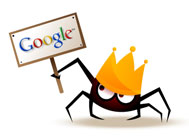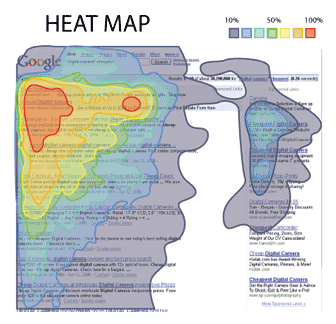Google is in the business of pleasing it’s customers – the searchers. It does it so well, that over 70% of all searches are done on Google. The other main search engines are Yahoo and Microsoft’s Bing. There’s also hundreds of others, some of which use Google as the engine to drive their search results.
Google has won it’s 70% market share by being the best. It’s really that simple. They know how to display the results that matter and give their customers the best information.
How Google Gets It’s Listings

Google Spider
The Internet is a big place with over a billion web pages, so providing the best information that a searcher needs is a challenge. To create it’s listings, Google sends out an electronic spider to analyze every web page and determine what that page is about. It then adds those pages to it’s index.
But with so many web pages online there may be hundreds of thousands of pages about any given subject, or keyword, as it’s called. How does Google then decide which pages are best? And further how does Google decide which ones to show on it’s coveted first page?
Search Basics
Evolution of Search
The Google Spider
Google has a complex mathematical, and secret, formula for determining the “PageRank” of any given page. This formula is called an algorithm. This algorithm analyzes the data the the spider returns and comes up with a ranking for every page.
Google’s algorithm uses a combination of on-page and off-page criteria to rate a page and then displays that page based on this quality score. Factors like how the main keyphrase of a page is used in the content and in the source code help Google determine it’s ranking.
For example, because Google looks at a page’s source HTML code (Hypertext Markup Language), it can see information that we don’t see in a browser window. These HTML tags provide meaning and importance to the use of these keywords on a given page. Tags for things like headlines, and bold phrases, imply these elements are more important so Google makes sure to notice how keywords are used in these elements of the page.
Other important cues that Google looks for include:
- Whether the keyword is used in the pages URL (page name)
- Does the domain name contain the keyword
- Do anchor links from within the site contain the keyword
- Is the keyword used in the “title” tag in the HTML code
- How old is the page
Off-page Factors
The above are the “on-page” factors that effect Google’s ranking but there are also many “off-page” factors as well.
Backlinks
If Google sees that other pages on the Internet link to a site it counts that as a vote of confidence for that site. This “link popularity” of a site is an important factor in Google’s ranking. Most of the top sites in Google’s eyes have thousands of other sites that link to them. Of course the higher the rankings of these other sites the more weight is given to that “vote”. So building a large fleet of “backlinks” from authority sites is an important part of making a site “search engine friendly.”
These tactics to help a website make it to the first page of Google are called Search Engine Optimization. Anyone who has a website has become aware that SEO is an important part of building a website properly. Of course, if you have a site that is on page 2000 in Google’s listings then you may be painfully aware.
Why The First Page of Google Is So Important
Google Heat Map Showing Percent of Clicks

Google Search Heatmap
When a searcher looks for information (or products or services) the pages that are returned are called the Search Engine Results Pages or SERPs. Searchers very seldom get past the first page in the SERPs when looking for information. A Cornell study found that position #11 (top of the 2nd page) got 1% of all clicks. It goes down quickly from there.
So it’s easy to see why it’s so important to be on the first page of Google.
In fact, exactly where your listing is on that first page is also important. Position number 9 on that first page only gets 1.45% of the clicks.
What about position #1?
It gets roughly 42% of the clicks according to various studies.
After about the 3rd or 4th position, click through rates go down quickly. Roughly 80% of all clicks come from those first 4 positions.
Fighting For The First Page
So you can see why people work so hard to get on the first page of Google. That’s simply where all the action is. And if you are on page 3 you might as well be on page 2000. You probably will get the same number of clicks.
So How Many Clicks Are We Talking About?
Of course it depends on the keyphrase that is being searched, but if the keyword has high demand, we can be talking about tens of thousands of visitors from clicks on high-demand keywords.
For example, according to Google’s Keyword Research Tool the phrase “online marketing” gets 27,000 searches per day. If you are in the top position for that keyphrase then you should get about 11,000 visitors per day from that position. I guess that’s why Search Engine Optimization specialists are in such high demand.
AdWords
Another way to get on the first page of Google is to buy your way in. Google offers something called AdWords where you bid for positions in the Sponsored Listings. The higher position you want the more you pay. This is actually how Google makes most of it’s money and they turned Pay Per Click into the amazing marketing tool that it has become.
» To learn more about Pay Per Click and AdWords take a look at this page



